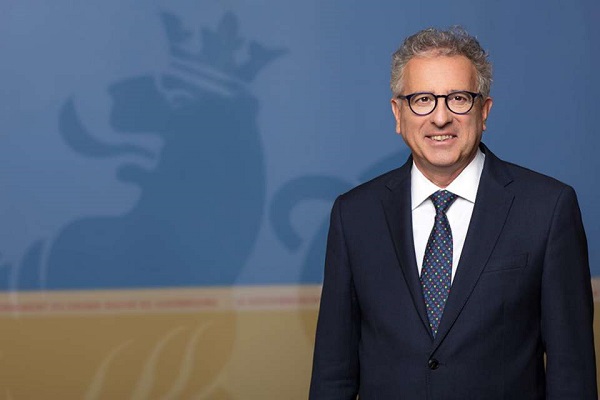 Finance Minister Pierre Gramegna;
Credit: SIP / Yves Kortum
Finance Minister Pierre Gramegna;
Credit: SIP / Yves Kortum
On Friday 22 January 2021, Luxembourg's Minister of Finance, Pierre Gramegna, presented the country's public finances as of 31 December 2020 during a joint meeting between the Finance and Budget Committee and the Budget Execution Control Committee of the Chamber of Deputies (Parliament).
Central government revenue remained impacted by the COVID-19 crisis and amounted to €18.8 billion at the end of December 2020. This represents a loss of €1.5 billion or 7% compared to the voted budget.
Revenue collected by the administration of direct contributions (Administration des contributions directes) amounted to €9,096 million, which represents a decrease of €386 million (down 4.1%) compared to the previous year. Those of the administration of registration, domains and VAT (Administration de l'enregistrement, des domaines et de la TVA) amounted to €5,517 million, a decrease of €77 million (down 1.4%) compared to 2019.
Similarly, the revenues of the Customs and Excise Agency witnessed a decrease of 23.39% in petrol sales (i.e. a decrease of 112.8 million litres) and of 21.14% in diesel sales (i.e. a decrease of 460.6 million litres) compared to 2019. Thanks to this development, Luxembourg was able to fully meet its commitment to reduce its CO2 emissions by 20% compared to 2005, without resorting to greenhouse gas emissions compensation certificates. In total, the revenues collected by the Customs and Excise Agency amounted to €1,614 million, a decrease of €164 million (down 9.2%) compared to 2019.
However, thanks to the slight upturn in economic growth in the third quarter (up 0.5% over one year according to STATEC) as well as in the fourth quarter of 2020, public finances improved by 5.3% compared to the latest central government revenue forecast for the year 2020, established in the framework of the 2021 budget.
Government expenditure amounted to €21.1 billion as of 31 December 2020, an increase of €251 million or 1.2% compared to the voted budget; the additional period will continue until the end of April 2021.
The high level of public spending is explained by the state's efforts to fight against the COVID-19 pandemic and ensure economic recovery. As of 31 December 2020, €937 million had been spent on partial unemployment, €235 million to finance family leave and €194 million on the management of the health crisis and public health, as well as €103 million on direct non-repayable aid for microenterprises and the self-employed. The total government expenditure at the end of the year also takes into account the exceptional charge of €386 million following the assumption by the state of certain expenses borne by the health and maternity insurance. Likewise, as had been planned before the crisis, public investments were maintained at a record level, reaching €2.7 billion, which corresponds to an increase of 27.4% over one year. As a result, government expenditure at the end of the fourth quarter of 2020 was €2.6 billion or 14.5% higher than at the end of the fourth quarter of 2019.
Given the gradual recovery of the Luxembourg economy, certain expenses related to the management of the crisis may however have been limited compared to previous forecasts.
Thanks to the developments described above, the jaws effect between public revenue and expenditure is slightly less pronounced than expected. Whilst the latest forecasts expected a deficit of €5 billion for the year 2020, the government balance actually had a deficit €2.36 billion at the end of December. Even if the amount of expenditure is likely to increase further substantially during the complementary period, a smaller final deficit can be expected compared to the latest projections.
As of 31 December 2020, public debt stood at around €16 billion, which corresponds to around 26.5% of GDP, a level well below the 30% of GDP forecast in the government programme. Luxembourg is therefore the country in the euro zone whose debt level increased the least in 2020, while posting the lowest level of public debt after Estonia.
Finance Minister Pierre Gramegna commented: “In a context which remains difficult, the slightly better evolution of public finances in the fourth quarter of 2020 testifies to the gradual recovery of the Luxembourg economy. The many measures put in place by the government to support the revival and to protect jobs, together with the vaccination campaign, will help to reinforce this trend during the year 2021. While the budget balance improved in the fourth quarter, it should not be forgotten that the accounting year is not closed until after an additional period has elapsed, during which substantial expenditure will still be made for the 2020 financial year. Notwithstanding the first signs which inspire confidence, the situation of public finances remains therefore tense and prudence is required".








